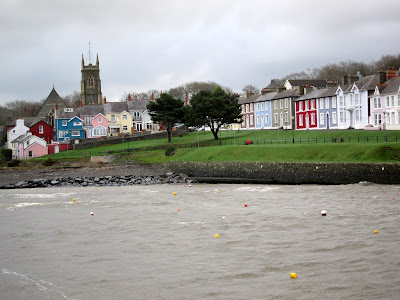The Power of Words
Landmarks by Robert Macfarlane is about the power of words to shape our sense of place. When the majority of people lived and worked in rural areas, they developed very specific words to clearly explain the state of the weather and physical or geographical features. As city dwellers, we’ve lost so many words from our vocabulary: “The terrain beyond the city fringe has become progressively more understood in terms of large generic units (‘field’, ‘hill’, ‘valley’, ‘wood’). It has become a blandscape. . . . It is not, on the whole, that natural phenomena and entities themselves are disappearing; rather that there are fewer people able to name them, and that once they go unnamed they go to some degree unseen.”
This may seem insignificant – it’s only words, after all. But words shape how we see the world and how we interact with it. If I don’t have a name for a caterpillar, will I care enough to protect it - will I even notice it? Will a field be worth saving from a freeway if I’ve never tramped across it, identifying the wildflowers by name as the seasons pass? Do we also lose a sense of magic when our vocabulary is defined by describing our actions on the internet? Max Weber saw "disenchantment as the distinctive injury of modernity” defining it as ‘the knowledge or believe that . . . there are no mysterious incalculable forces that come into play, but rather that one can, in principle, master all things by calculation’. . . . For Weber, disenchantment was a function of the rise of rationalism”.
This is not an easy book to read. It’s somewhat elitist as Macfarlane describes works by various nature writers and his personal relationship with them. It’s also very British, although Macfarlane’s comments on how difficult it is to describe moorland can just as easily apply to the Canadian Prairies: “like other extensive lateral landscapes – desert, ice cap, prairie, tundra – it confronts us with difficulties of purchase (how to anchor perception in a context of immensity) and evaluation (how to structure significance in a context of uniformity).”
If you love words, you will enjoy the glossaries, long lists of all-but-forgotten words. Here are just a few. I’ve broken them into categories, but there is a lot of overlap, particularly between words that are descriptive and words that are delightful.
Descriptive Words
Lick-ups – clay clods dropped from wheels passing through heavy land (Suffolk)
Finger-cold – cold that is not bitter, but enough to make the fingers tingle (Kent)
Bar-slap – temporary gate in a gap in a drystone wall (Galloway)
Land-lash – high winds and heavy rain (English)
Box the fox – to raid an orchard (Ireland)
Thunder-lump – rain-cloud hanging over a place (Shetland)
Beetle-scrunchers – large feet (Suffolk)
Yew-yaw – to walk crookedly (Suffolk)
Water-carts – small clouds (Suffolk)
Delightful Words
Griggles – small apples left on the tree (southwest England)
Swidge – puddle (Suffolk)
Dringey – light rain that still manages to get you soaking wet (Lincolnshire)
Hob-gob – nasty, choppy sea (Suffolk)
Squiggle – to wiggle through a hedge (Essex)
Skiddle – to throw flat stones so that they skim on the surface of water (Galloway)
Burrahblas – torrent of brutal rage (Gaelic)
Burnt-arse fire – will-o’-the-wisp (Fenland)
Fairy darts – prehistoric arrowheads turned up in ploughing (Herefordshire)
Gallitrop – fairy ring (Devon, Gloucestershire, Somerset)
Dook – to swim in open water (Scots)
Very Precise Words
Smout – hole in a hedge used by a hare (Derbyshire, Lincolnshire, northern England, Somerset)
Smeuse – gap in the base of a hedge made by the regular passage of a small animal (Sussex)
Roke – fog that rises in the evenings off marshes and water meadows (East Anglia)
Huffling – wind blowing up in sudden gusts (Exmoor)
Regional Differences
Aquabob – icicle (Kent)
Clinkerbell, cockerbell, conkerbell – icicle (Dorset)
Tankle – icicle (Durham)
 |
| Aberaeron |
Residual Words
(some lost words live on in place names)
Winterbourne – intermittent or ephemeral stream, dry in the summer and running in winter, usually found in chalk and limestone regions (Berkshire, Dorset, Wiltshire) – as in Winterbourne, Gloucestershire, UK (established on the banks of Bradley Brook)
Aber – mouth of a river (into the sea), estuary; confluence of a lesser with a larger river (Welsh) as in Aberaeron (mouth of the Aeron River) and Aberystwyth (mouth of the Ystwyth River), Wales
Bill – promontory (southern England) – as in Portland Bill (the southernmost end of the Isle of Portland, Dorset)
See Also
The Lost Words Illustrated






Comments